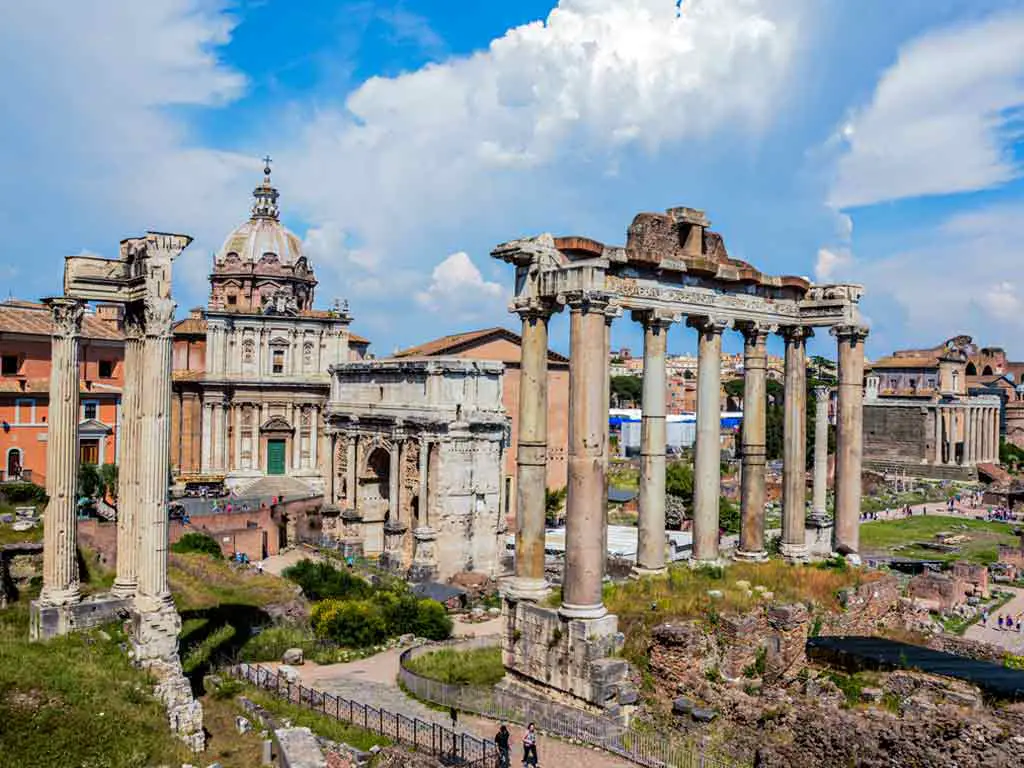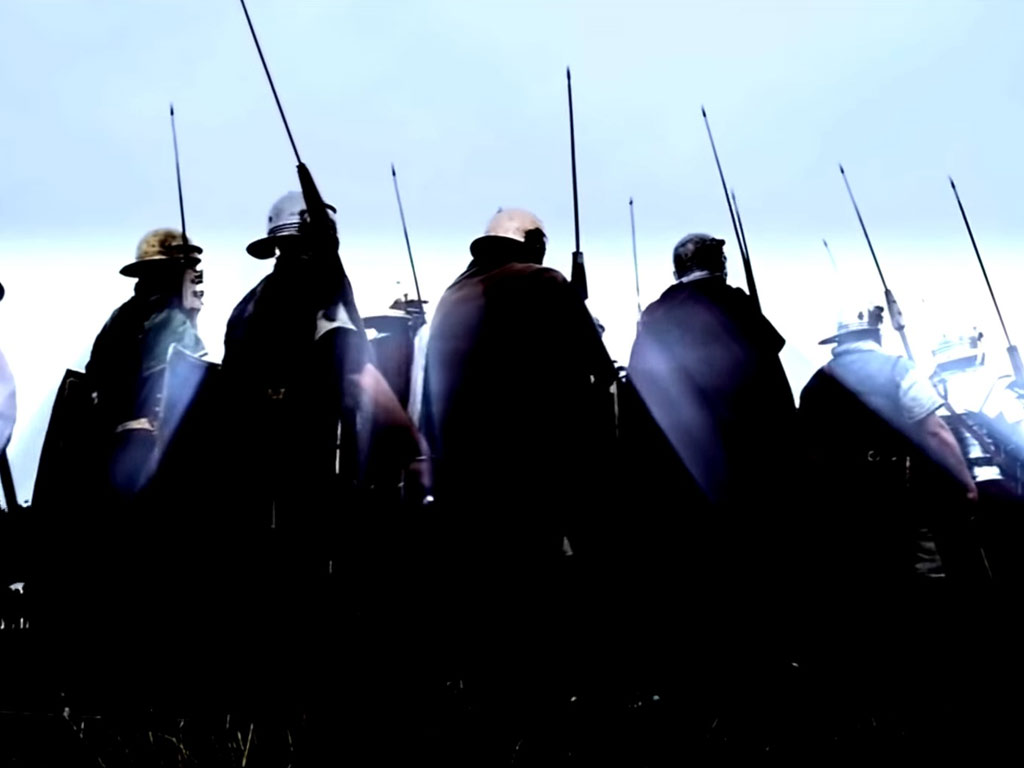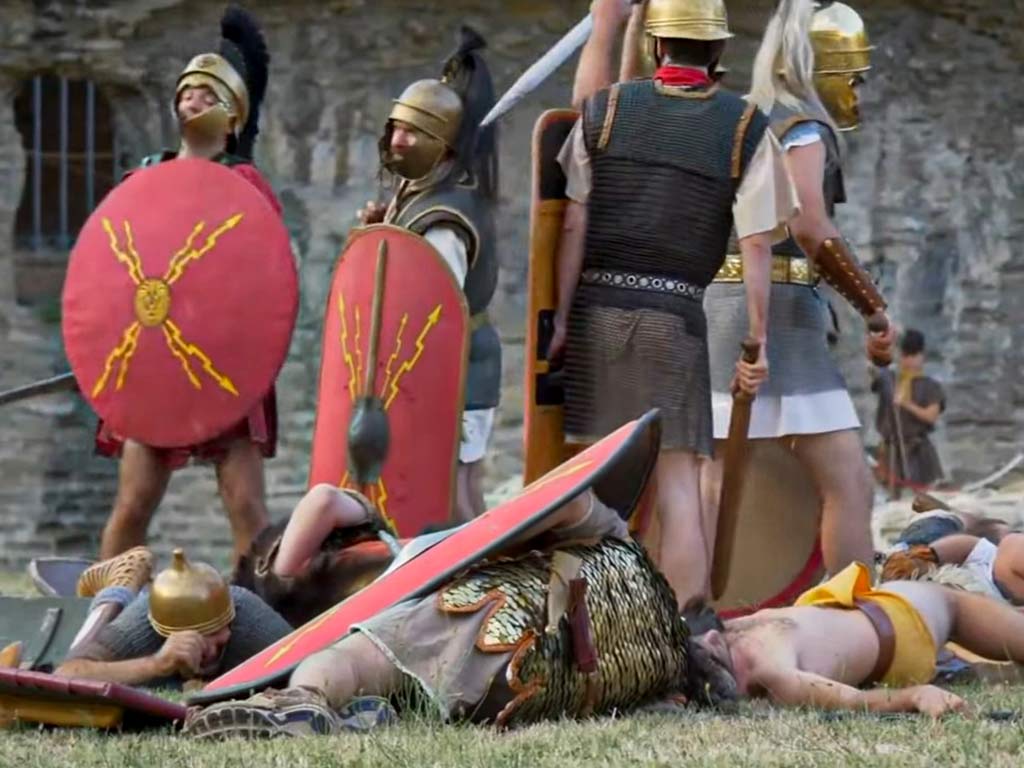In the hypothetical realm of “What if Rome Never Fell,” we embark on an alternate historical journey where the grandeur of the Roman Empire endures through the ages.
Imagining an unbroken legacy that transcends time, this exploration unveils a world where Rome’s influence spans continents, shaping languages, cultures, and religions in unforeseen ways.
Envision a global stage where Latin emerges as a universal language, challenging the rich tapestry of linguistic diversity.
The uncharted territories of Africa, Asia, and the New World become canvases for a Roman narrative, while the course of Islam, the fate of empires, and the quest for global governance take unforeseen trajectories.
This speculative odyssey invites us to ponder the profound impact of Rome’s perpetual ascendancy on the evolution of human civilization.

What if Rome Never Fell Alternate History?
In the vast tapestry of history, the decline and fall of the Roman Empire is often considered a turning point that altered the course of human civilization.
However, this alternate historical exploration invites us to envision a world where Rome’s splendor endured, shaping the destinies of nations far beyond its ancient borders.
What if the grandeur of the Roman Empire persisted, its influence spreading relentlessly across continents?
How might this unbroken legacy have sculpted the global tapestry of cultures, languages, and religions?
Lingua Romana: A Global Vernacular
In a world where Rome’s dominion continued to expand, the Latin language would have transcended its origins, becoming a global lingua franca.
In this alternate reality, Latin might not only endure within the traditional boundaries of the Mediterranean but reach across vast continents.
The consequence? A potential reduction in linguistic diversity, with Latin serving as either the primary or secondary language for a significant portion of the world.
The very survival of languages such as German and Dutch might be in jeopardy, reshaping the linguistic landscape in ways unimaginable in our current reality.
The Uncharted Territories: Rome in Africa, Asia, and the New World
Picture an alternate Earth where Roman conquests extended beyond Europe, encompassing Africa and Asia, with echoes of their influence even in the New World.
The encounter between Roman legions and indigenous cultures in uncharted territories could have unfolded in ways far removed from the historical narratives we know.
How might the foundations of civilizations in Africa, Asia, and the Americas have been laid under the enduring shadow of the eternal city?
Islam at a Crossroads: The Impact on Religion
In this alternate history, Rome’s expansion into the Middle East and beyond would have undoubtedly influenced the trajectory of religious development.
The rise of Islam, a defining force in our world, might have faced either formidable resistance or undergone a radically different evolution.
Would the emergence of Islam have been hindered, or would it have adapted and coexisted with the enduring might of Rome? The implications for global religious landscapes are staggering to contemplate.
The Eternal Buffer: Sassanids, Mongols, and Beyond
With Rome extending its reach into the Middle East, the survival of the Sassanid Empire as an additional buffer against invasions would reshape the geopolitical chessboard.
The formidable legions of Rome might have repulsed later invasions, whether from the north of the Danube or the relentless Mongol hordes.
How would altered geopolitical dynamics influence the rise and fall of empires in the subsequent centuries? The ripples of such changes would echo through the pages of history.
Pax Romana Redux: Governance and Civil Strife
While Rome’s continued expansion might have brought about a semblance of stability, the sheer vastness of the empire would pose unprecedented challenges in terms of governance.
Civil wars and internal conflicts might persist until technological advancements allow for the efficient administration of such an expansive territory.
What technological leaps would be required to sustain a global Pax Romana, and how might these innovations have shaped the very fabric of our modern world?
Would Technology Be More Advanced if Rome Never Fell?

In this alternate historical exploration, the notion of a Rome that never fell invites us to ponder the profound impact of such continuity on the evolution of technology.
Could the stability and expansive reach of the Roman Empire have catalyzed a more accelerated march toward innovation and scientific discovery?
As we step into this speculative realm, we delve into the hypothetical scenario where the architectural wonders, engineering feats, and intellectual heritage of Rome serve as catalysts for a future where technology flourishes under the enduring shadow of ancient brilliance.
Engineering Marvels: Roman Ingenuity Unleashed
Imagine a world where the Roman Empire’s engineering prowess extends beyond aqueducts and roads.
In this alternate reality, the foundations laid by Roman architects and engineers become platforms for even grander projects.
Would the world witness early experiments with steam power, intricate machinery, or mechanical innovations inspired by the ingenious engineering of Rome?
The legacy of Roman ingenuity might unfold in ways that fundamentally alter the course of technological evolution.
Scientific Renaissance: Roman Legacy in Academia
In a timeline where Rome persists, an unbroken chain of intellectual pursuits from ancient Roman thinkers could have led to a sustained scientific renaissance.
The philosophical and scholarly contributions of Roman philosophers might serve as cornerstones for breakthroughs in mathematics, medicine, and natural sciences.
Could this early accumulation of knowledge propel humanity into an era of enlightenment, accelerating the pace of scientific discovery?
Global Exchange of Ideas: Roman Influence on Knowledge Transmission
The vast expanse of the Roman Empire could act as a global hub for the exchange of ideas.
With interconnected regions under Roman rule, the flow of knowledge might have transcended geographical barriers, fostering cross-cultural collaboration.
How might this accelerated exchange of information catalyze advancements in diverse fields, from astronomy to metallurgy?
The interconnectedness of a Roman-dominated world might spur innovation through the confluence of diverse perspectives.
Technological Governance: The Challenge of Managing a Global Empire
While technological progress surges forward, the governance of a sprawling global empire would present unique challenges.
The need for efficient administration might drive innovations in communication, logistics, and infrastructure.
How would the demands of governing a vast territory lead to the development of sophisticated administrative tools?
The pursuit of technological solutions for governance could reshape the landscape of administrative efficiency on an unprecedented scale.
Ethical and Cultural Dimensions: The Impact of Technological Advancement
As technology advances, ethical and cultural considerations become paramount. In a world where Rome’s influence endures, how might cultural values shape the ethical framework surrounding technological development?
Would the integration of technology into societies be more harmonious, with respect for cultural nuances guiding innovation?
This intersection of ethics, culture, and technology in a world shaped by Roman ideals opens avenues for a nuanced exploration of the societal impacts of technological advancement.
How Did Rome Fall?
The fall of Rome is a complex historical event that unfolded over centuries, marked by a combination of internal decay and external pressures.
While historians debate the precise causes, several key factors contributed to the decline and eventual fall of the Roman Empire:
Here are the main reasons for the Fall of Rome:
Political Instability

Rome’s political structure faced a tumultuous period characterized by frequent changes in leadership.
The assassination of emperors and power struggles within the ruling class created a cycle of instability.
The lack of stable governance hindered effective decision-making and contributed to the weakening of the central authority.
Economic Decline
The Roman economy, once robust, began to falter due to various factors. The reliance on slave labor led to unemployment among Roman citizens, while high taxation and inflation strained the economic system.
Additionally, the decline of agriculture, a vital sector, exacerbated economic woes, creating a vicious cycle of dwindling resources and increasing hardships for the population.
Military Overspending
Maintaining an extensive empire required a formidable military presence, but the associated costs strained the Roman treasury.
The need to defend expansive borders and the expenses of maintaining a standing army, coupled with corruption within the military hierarchy, led to financial crises and contributed to the economic decline of the empire.
Barbarian Invasions
Rome faced relentless invasions from various barbarian groups. The Visigoths’ sack of Rome in 410 AD and the Vandals’ subsequent plundering in 455 AD highlighted the empire’s vulnerability.
These invasions not only weakened the empire’s defenses but also shattered the perception of Rome as an invincible force.
Division of the Empire
In an attempt to address governance challenges, Emperor Diocletian divided the Roman Empire into the Eastern and Western Roman Empires.
While the Eastern Roman Empire (Byzantine Empire) persisted for centuries, the Western Roman Empire faced more immediate challenges, including internal strife and external invasions.
Internal Conflict and Civil Wars
The Crisis of the Third Century witnessed internal conflicts and civil wars as rival claimants fought for control of the empire.
These power struggles further fragmented the empire, contributing to its overall decline and creating an environment where regional leaders and military commanders held significant influence.
Weakening of Roman Values
Traditional Roman values such as civic duty, discipline, and patriotism began to erode. Corruption, hedonism, and a decline in the sense of civic responsibility weakened the social fabric.
The erosion of these core values contributed to a loss of cohesion and a sense of shared purpose among the Roman populace.
Christianization of the Empire
The adoption of Christianity as the state religion, particularly under Emperor Constantine, initially served as a unifying force.
However, internal religious conflicts arose as different Christian sects vied for dominance.
Additionally, the redirection of resources to build Christian institutions diverted funds from traditional state functions, impacting the empire’s overall resilience.
The Final Blow: 476 AD
The symbolic date marking the fall of the Western Roman Empire is 476 AD when the last Roman emperor, Romulus Augustulus, was overthrown by the Germanic chieftain Odoacer.
While this event is a historical milestone, it encapsulates the cumulative impact of centuries of decline and sets the stage for the transformation of Europe in the medieval period.
How Did the Fall of Rome Impact the World?

The fall of the Roman Empire in the West had profound and far-reaching consequences that reverberated across the world, shaping the course of history for centuries to come.
The impact of Rome’s collapse touched upon various aspects, including politics, culture, religion, and societal structures.
Political Fragmentation
The dissolution of the Western Roman Empire led to a power vacuum, giving rise to numerous independent states and territories throughout Europe.
The once-unified political entity fractured into smaller kingdoms and principalities, setting the stage for the medieval period.
This fragmentation reshaped the geopolitical landscape and contributed to the decentralization of political authority.
Cultural Transformation
Rome’s fall marked the end of classical antiquity and the beginning of the medieval era. The shift from Roman governance to feudalism brought about changes in societal structures, economic systems, and cultural norms.
The decline of centralized urban centers and the rise of rural manors altered the cultural fabric, leading to a more localized and decentralized way of life.
Preservation and Transmission of Knowledge
The fall of Rome threatened the preservation of knowledge and intellectual pursuits.
However, the Byzantine Empire in the East acted as a repository of Roman culture and knowledge.
The preservation of classical texts by Byzantine scholars and later by Islamic scholars during the Islamic Golden Age played a crucial role in transmitting ancient wisdom to later civilizations, including the Renaissance in Europe.
Rise of New Powers
With the collapse of Roman authority, new powers and civilizations emerged to fill the void.
Germanic tribes, such as the Visigoths, Ostrogoths, Vandals, and Franks, asserted themselves in different regions, establishing their kingdoms.
Meanwhile, the Byzantine Empire continued as a formidable force in the East, preserving elements of Roman governance, culture, and art.
Impact on Christianity
The fall of Rome had a profound impact on the spread and development of Christianity. Initially persecuted, Christianity eventually became the dominant religion in the Roman Empire.
The fragmentation of the empire allowed Christianity to spread independently in various regions, influencing local cultures and traditions.
The Church, with its centralized structure, also played a crucial role in providing stability during times of political upheaval.
Economic Shifts
The decline of Rome led to significant economic shifts. With the collapse of long-distance trade networks and the decentralization of political power, economic activities became more localized.
The feudal system, characterized by land ownership and agricultural production, replaced the complex economic structures of the Roman Empire.
The diminished economic interconnectedness had both positive and negative effects on local communities.
Enduring Architectural Legacy
While political and societal structures crumbled, the architectural legacy of Rome endured. Many Roman structures, including amphitheaters, aqueducts, and roads, persisted and were repurposed by succeeding civilizations.
The architectural achievements of Rome continued to inspire later generations and became a symbol of ancient engineering prowess.
What if the Roman Empire Never Existed?

The hypothetical scenario of a world without the Roman Empire invites us to reimagine the course of human history.
What if the formidable might of Rome had never materialized, and the ancient Mediterranean landscape had remained a patchwork of diverse cultures and city-states?
Let’s delve into what if the Roman empire never existed:
The Absence of Roman Law and Governance
Without Rome, the evolution of legal and governance systems would have taken vastly different paths.
The Roman Republic’s contributions to law, governance, and the concept of citizenship would not have become cornerstones of Western political thought.
The absence of Roman institutions might have allowed alternative models to flourish, shaping the principles that guide societies worldwide.
Diverse Cultural Landscapes
The absence of Roman conquests would have preserved the distinctive cultural identities of numerous regions around the Mediterranean.
Greek, Persian, Carthaginian, and other cultures might have continued to thrive independently, influencing each other without the homogenizing effect of Roman assimilation.
The rich tapestry of diverse traditions and languages could have persisted, fostering a global mosaic of cultures.
Different Religious Landscapes
The rise of Christianity within the Roman Empire significantly shaped the religious landscape of the Western world.
Without Rome, the spread of Christianity might have followed alternative routes, potentially taking longer to gain prominence or evolving in different theological directions.
Other belief systems indigenous to various regions could have played more central roles in shaping spiritual and moral frameworks.
Altered Geopolitical Dynamics
The geopolitical stage of Europe, North Africa, and the Middle East would have evolved along different lines in the absence of Roman conquests.
Alternative power structures might have emerged, with different civilizations exerting influence over regions that historically fell under Roman rule.
The ebb and flow of empires and alliances could have created a geopolitical map vastly dissimilar to the one we know today.
Technological and Architectural Developments
Rome’s engineering marvels and technological advancements have left an indelible mark on history.
Without Roman influence, other ancient cultures might have taken center stage in technological innovation and architectural achievements.
The absence of Roman infrastructure, such as roads and aqueducts, could have redirected human ingenuity towards alternative feats of engineering.
Different Paths of Exploration and Colonization
Rome played a pivotal role in shaping the concept of empire-building and colonization.
In a world without Rome, other civilizations might have undertaken maritime exploration and colonization efforts, leading to the discovery of new lands and the exchange of goods, ideas, and cultures along different trade routes.
To Recap
In the speculative landscape of “What if Rome Never Fell,” the tapestry of human history is woven with threads of endless possibilities.
The enduring might of Rome, unbroken through the ages, reshapes the world into an unrecognizable yet captivating mosaic.
As we traverse this alternate reality, we glimpse a global stage where languages merge, cultures blend, and the course of religions diverges.
The echoes of a never-fallen Rome reverberate through uncharted territories and altered geopolitical dynamics.
Yet, amidst the what-ifs, one constant prevails — the indomitable spirit of human adaptability.
The exploration of this alternate history serves as a poignant reminder that our world, shaped by the vicissitudes of time, remains an ever-evolving testament to the profound interplay of possibilities and inevitabilities.

Leave a Reply